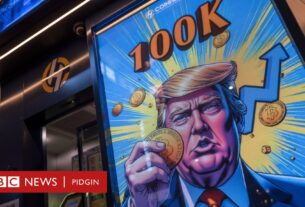- Bitget Ranks Among Top 3 Crypto Exchanges for Futures
- Bill Gates Expressed Skepticism Towards Bitcoin: ‘I Would Short It’ If Possible
- Why Is XRP Down Today? XRP Price Prediction for 2024 and 2025
- Blockchain News: Everything You Need to Know About New Cryptocurrency The Deep State ($DST)
- Who is Satoshi Nakamoto, the creator of Bitcoin?
El Salvador, the first country to make Bitcoin legal tender, is continuing its ambitious plan to accumulate Bitcoin despite pressure from international organizations like the International Monetary Fund (IMF). The IMF recently advised the country to slow down its Bitcoin purchases, but El Salvador has ignored the warning, continuing to add Bitcoin to its reserves at an accelerated pace.
Bạn đang xem: El Salvador, Argentina, and Brazil Shape the Future of Cryptocurrency in Latin America
Over the Christmas period, the government purchased 12 BTC, followed by another BTC the next day. Since then, El Salvador has been acquiring 1 Bitcoin every day, keeping up with its plan to increase its Bitcoin holdings. The country’s Bitcoin Office even shared its progress on social media, proudly describing, “Like a boss, El Salvador continued adding one BTC per day to our Strategic Bitcoin Reserve.”
This steady buying strategy is part of El Salvador’s broader economic vision. While some critics, including the IMF, have questioned the country’s Bitcoin policy, El Salvador’s government is determined to prove that Bitcoin can play a crucial role in the country’s financial future. The continued purchases are also a clear signal to the world that El Salvador is committed to its Bitcoin agenda.
Argentina Freezes $3.5 Million in Tether Linked to Fraud Scheme
Xem thêm : North Korean hackers account for over 60% of all global cryptocurrency stolen in 2024
In Argentina, the country’s authorities have made a significant move against cryptocurrency fraud. For the first time, Argentina’s justice system has ordered the freezing of Tether (USDT) assets in connection with a fraudulent investment scheme called Rainbowex.
Rainbowex, which is alleged to be a pyramid scheme, affected thousands of Argentine citizens, and the authorities have taken strong action to halt the flow of funds. As part of the investigation, $3.5 million worth of USDT was frozen. This is a major development, as it marks the first time the Argentine government has directly interacted with Tether to freeze assets tied to a criminal case.
The freeze is part of a larger crackdown on Rainbowex, which included 22 search warrants and the arrest of 10 individuals involved in the operation. The authorities are also working with international agencies to track down suspects linked to the scheme. This is a clear indication that Argentina is tightening its grip on cryptocurrency-related fraud and taking steps to regulate the sector more effectively.
The Argentine government’s ability to freeze USDT assets through collaboration with exchanges and private sector firms, like Chainalysis, demonstrates the increasing influence of regulators over cryptocurrency markets. As the crypto industry grows, more countries are expected to take similar actions to address fraud and ensure that digital currencies are used responsibly.
Brazil’s Debate Over Central Bank Digital Currency (CBDC)
In Brazil, the conversation surrounding the country’s central bank digital currency (CBDC), known as Drex, is gaining momentum. The Brazilian government has been pushing forward with plans to introduce Drex, which will be a digital version of the Brazilian real. However, not everyone is on board with the idea, and there are growing concerns about the future of physical money in Brazil.
Xem thêm : Luxury Brands May Soon Let You Pay in Cryptocurrencies
Brazilian Congresswoman Julia Zanatta has raised alarms about the potential dangers of a mandatory digital currency system. She fears that the widespread use of Drex could eventually lead to the elimination of cash, restricting people’s financial freedom. In a recent interview, Zanatta stated that she would fight against a bill that seeks to phase out cash in favor of electronic transactions and Drex.
Zanatta has proposed a new bill to protect the use of physical money, arguing that Brazilians should have the choice to use cash if they prefer. She believes that forcing people to rely solely on digital currency could lead to more control over citizens’ financial activities and reduce their economic freedom.
The debate over Drex highlights the challenges countries face as they explore the future of money. While digital currencies like Drex promise convenience and efficiency, they also raise concerns about privacy, control, and the potential for exclusion. Brazil is not alone in these debates, as other nations are also considering the implications of CBDCs and the role they will play in the global economy.
The Future of Crypto in Latin America
Latin America is becoming a hotbed for cryptocurrency activity, with countries like El Salvador, Argentina, and Brazil leading the way in shaping the future of digital assets. While El Salvador is doubling down on Bitcoin, Argentina is taking action against cryptocurrency fraud, and Brazil is exploring the possibilities of a digital currency.
These developments signal that Latin America is not only adopting cryptocurrencies but also working to regulate and integrate them into the traditional financial system. As these countries continue to navigate the complexities of digital currencies, they are setting important precedents for the rest of the world.
Post Views: 2
Nguồn: https://gapinsurance.click
Danh mục: News




